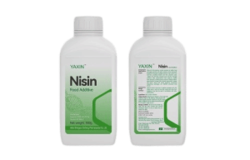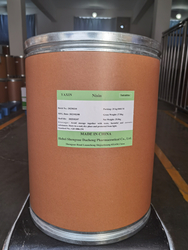
Hebei Shengxue Dacheng Pharmaceutical Co., - | E-Showroom

Hebei Shengxue Dacheng Pharmaceutical Co., - | E-Showroom
Hebei Shengxue Dacheng Pharmaceutical Co.,
Luancheng Shengxue Road No.50 Shijiazhuang Hebei Shijiazhuang
China
Nisin is a naturally occurring antibacterial peptide that has been widely used in the food, beverage, and pharmaceutical industries. It is a type of bacteriocin produced by Lactococcus lactis, a lactic acid bacteria commonly found in dairy products. Nisin is known for its strong antimicrobial activity against a wide range of Gram-positive bacteria, including several foodborne pathogens. In this article, we will explore the properties and applications of Nisin, as well as its potential health benefits.
Properties of Nisin
Nisin is a heat-stable and pH-stable peptide, which makes it suitable for use in a variety of food and beverage products. It is also resistant to enzymatic degradation, which increases its shelf-life and stability. The molecular weight of Nisin is around 3.5 kDa, and it is composed of 34 amino acid residues. Nisin has five amino acids that are modified by post-translational modifications, including lanthionine and methyllanthionine. These modifications increase the stability and activity of Nisin, making it a potent antimicrobial agent.
Mechanism of Action
Nisin exerts its antimicrobial activity by disrupting the cell wall of target bacteria. It binds to the lipid II molecule, which is involved in peptidoglycan synthesis, and forms a complex that interferes with the normal functioning of the cell wall. This results in the leakage of intracellular contents and eventually cell death. Nisin has been shown to be effective against a wide range of Gram-positive bacteria, including Listeria monocytogenes, Staphylococcus aureus, and Bacillus cereus.
Morocco Yellow Pages Online is a Local Business to Business Directory in Morocco offering business list of more than 250,000 companies. You can find Hotels in Morocco , Companies in Morocco , Properties in Morocco , Travel info in Morocco through this Site. Yellow Pages Morocco Updated in 2025 Get Maximum Benefit for your Business Visit YP MarketPlaces
| About Us Careers Company Information User Guide About Us |
Buying Options Post Buying Leads Browse Categories Companies in Morocco How to Buy |
Selling Options Post Selling Leads Browse Categories How to Sell |
Safety & Support Help Safety & Security Copyright Infringment |
Advertising How to Advertise? Host Website with us Elite Membership |
Method Of Payment Privacy Policy Refund Policy Dispute & Resolution Policy Terms |
| Thanks for Posting your Requirement
with
Morocco Yellow Pages Online
If you are not Verified Buyer then Please Verify Your Email to get Quotes from Verified Suppliers. |








|
Thanks for Reporting Error in Listing of on Morocco Yellow Pages Online
Our Technical Team will review the Information and will Rectify the Error as Soon as Possible. |
| Thanks for Reply.
Morocco Yellow Pages Online
Your Reply is Sent to the Buyer. |
| Thanks for Reply.
Your Reply is Sent to the Seller. |
| Ok Close |


